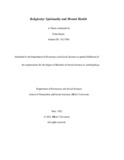| dc.contributor.advisor | Sabur, Seuty | |
| dc.contributor.author | Hasan, Tahia | |
| dc.date.accessioned | 2022-11-22T08:22:05Z | |
| dc.date.available | 2022-11-22T08:22:05Z | |
| dc.date.copyright | 2022 | |
| dc.date.issued | 2022-05 | |
| dc.identifier.other | ID: 18217001 | |
| dc.identifier.uri | http://hdl.handle.net/10361/17609 | |
| dc.description | This thesis is submitted in partial fulfillment of the requirements for the degree of Bachelor of Social Science in Anthropology, 2022. | en_US |
| dc.description | Cataloged from PDF version of thesis. | |
| dc.description | Includes bibliographical references (pages 27-28). | |
| dc.description.abstract | Religion has always been a source of spiritual guidance and reassurance for the followers because
of the moral template it provides. However, with the advancement of science and technology,
people have slowly drifted away from religion today. Despite the separation of religion from state
in “secular” countries like Bangladesh, there is still an implicit presence of religion in the public
spheres. But even so, in the newer generations, an increasing trend of neglect towards spirituality
is noticeable.
Since religion/ spirituality is always put against “secularism” or modernity, the current generation
leans toward scientific and “logical” explanations instead of relying on theistic explanations to
understand the world. But even so, there are groups of people in society who still actively choose
to practice their faith among their non-religious counterparts. This undoubtedly sidelines the
people who are pious and strict followers of religion since they’re increasingly losing people they
could connect to on similar grounds. This in turn, impacts the mental health of the sidelined people
since making sense of the world around them in relation to their beliefs becomes difficult. The
treatment these people receive for their faith and inclination towards spiritual guidance instead of
“logical explanations” is quite similar if not the same as experiencing culture shock in a completely
new environment. This triggers the feeling of helplessness and isolation among the pious and they
start feeling like an outsider in their own communities.
As a result, in this research, I would like to look at the struggles spiritual people are facing in a
society where there is a disjuncture between spirituality and other ways of life. For this, I conducted
interviews with female university students from public and private universities in Bangladesh, who
has experienced similar experiences of seclusion. From this data, I tried to derive the impacts it
has on the lives of these people, especially their mental health and sense of belonging since faith
4
and spirituality play an important part in building an individual's character and morale.
Understanding the way these people navigate and make sense of the “secular” world around them
is the main motive. As a result, my main research questions are - what is “spirituality” to the
contemporary young adults of Bangladeshi society, how modern secular society is affecting their
spirituality and in turn, how this is impacting their mental health.
Although my hypothesis is that spiritual people have been feeling threatened and unwelcome in
today's non-spiritual society, upon closer inspection it became evident that these people aren’t
always “victims” of the situation. Rather there are certain categories of pious people who are able
to combat the prejudices and hold their ground. They continue to navigate their worldview through
the lens of religion even if their views may not completely align with the people around them.
Although these people are very few in number as of yet and there are social factors like class and
hierarchy involved that allow them greater privileges, these individuals who are fighting for the
right to exercise their faiths freely do exist and are creating a space for themselves in society. | en_US |
| dc.description.statementofresponsibility | Tahia Hasan | |
| dc.format.extent | 28 Pages | |
| dc.language.iso | en_US | en_US |
| dc.publisher | Brac University | en_US |
| dc.rights | Brac University theses are protected by copyright. They may be viewed from this source for any purpose, but reproduction or distribution in any format is prohibited without written permission. | |
| dc.subject | Religiosity | en_US |
| dc.subject | Spirituality | en_US |
| dc.subject | Mental Health | en_US |
| dc.subject.lcsh | Psychology, Religious--Congresses. | |
| dc.title | Religiosity/Spirituality and Mental Health | en_US |
| dc.type | Thesis | en_US |
| dc.contributor.department | Department of Economics and Social Sciences, Brac University | |
| dc.description.degree | BSS in Anthropology | |

